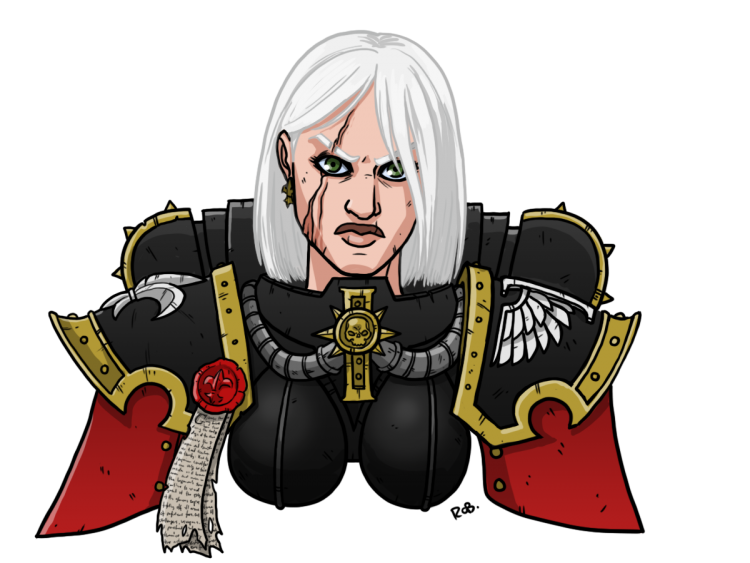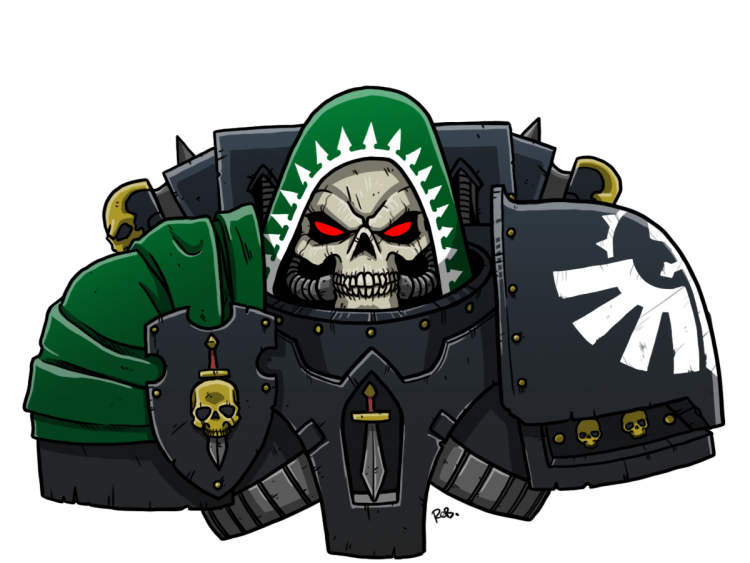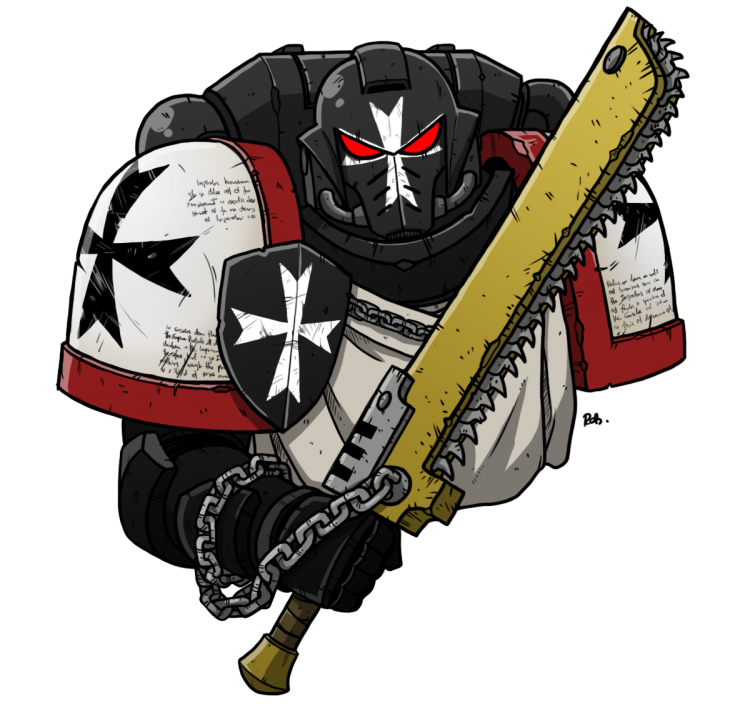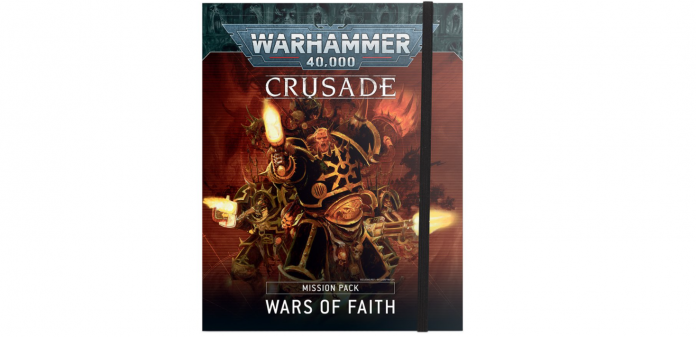It’s a busy time for 40k releases! After delays pushed back the December releases we’ve had back-to-back-to-back weekends of releases, including a new Cruasde mission pack releasing this week alongside Vigilus Alone. Wars of Faith is the latest in Games Workshop’s Crusade book releases, following other mission packs such as Beyond the Veil, Plague Purge, and Amidst the Ashes, with new rules for fighting battles of faith between armies hopped up on religious fervor.
Before we dive into this review we’d like to thank Games Workshop for sending us a preview copy of the book for review purposes.
Wars of Faith Games
If you’ve seen one of the prior Crusade books in the series, you’ll know that every one of these has some special gimmick. For Beyond the Veil it was Investigation points you’d track while trying to figure out what was going on; for Containment it was Planetstrike missions, and for Catastrophe it was multiplayer mode. In Wars of Faith the big mechanic is faith – Each Army in a War of Faith has a Faith that they select. During the campaign they’ll dedicate themselves to this particular faith, gaining points and rewards as they prove their devotion and worth to their deity.
Each of the game’s factions has a Recommended Faith, such as Khorne armies being dedicated to Divine Fervor or Necrons being dedicated to the Machina Eternal. As armies win games and accumulate belief points, they’ll gain rewards from their Faith paths, which will then be channeled through their Idols. More on that in a bit. Most of the time armies score Faith points by winning games: 2 points for a win, and -1 for a loss. Accumulate points and you’ll go up in your belief level and gain rewards – 0-3 points for level 1, 4-8 for level 2, 9-15 for level 3, and so on.

Paragons
Paragons are Characters in your army who embody the tenets of their faith and have been blessed by their deity as a result. A Character can pick up the Paragon keyword by either doing something specific in a mission (this bonus only lasts for a single mission), or by using the new Paragon of Faith requisition, which makes them a Paragon permanently. Once a unit is a Paragon they gain an ability from their faith and can do an action to pass new abilities to your idols.
The Faiths
There are five faiths to choose from: Divine Piety, Purity of Dedication, Machina Eternal, Timeless Trickery, and Dark Fervour. Each one has its own rewards for achieving higher levels of Belief. Each faith also has 1-2 Anathema Faiths, which are diametrically opposed to yours. When your army goes up against one with an Anathema Faith, you treat your Belief level as one higher.
- Machina Eternal is the faith of the Adeptus Mechanicus and Necrons. The Idol abilities for this faith tend to boost Vehicle units, and at the first level your Idols will give nearby Vehicles the ability to regenerate 1 wound per turn. The Paragon ability for this faith, Iron Will, lets your paragon choose to reduce the Damage of an incoming attack to 0 once per battle round.
- Purity of Dedication is the faith of the Custodes, Space Marines, and T’au Empire. The abilities here have a number of effects, starting with Profound Oratory, which gives you +1 to your attempts to recite a litany or intone an invocation.
- Divine Piety is the faith of the Adepta Sororitas, Imperial Knights, Astra Militarum, Tyranids, and Genestealer Cults. This faith has a large number of Auras and affects your units’ aura abilities. The Paragon ability, Holy Abjuration, gives your paragon Objective Secured and the ability to deny the witch like a psyker, along with +2 to their Deny tests.
- Dark Fervor is the faith of Chaos Knights, Drukhari, Khorne, Nurgle, and Orks. These are combat perks. The Paragon ability, Avatar of Ferocity, gives your Paragon additional hits whenever they roll an unmodified 6 to hit.
- Timeless Trickery is the faith of the Aeldari, Slaanesh, and Tzeentch. These primarily focus on Psychic benefits and buffs to Psyker units. Paragons of this faith improve the range of their psychic powers by 6”.
Idols
Each of the War of Faith missions gives players Idols – marked objects placed on the battlefield on the battlefield from which players’ armies draw power and divine inspiration. An Idol will belong to one of the players, and the powers bestowed by each faith emanate primary from those Idols – most rewards and benefits are imparted on units within a certain range of the Idol. During missions players will huddle around and fight over these idols, and some missions will add additional rules for interacting with the idols.

Priest Battle Traits
A fitting addition to the Wars of Faith rules are new battle traits just for PRIEST models, giving players with a Chaplain, Dialogus, or Dark Apostles 6 bespoke battle traits to choose from (for some bizarre reason, T’au Ethereals do not have the PRIEST keyword, but they should). Every one of these traits interacts with how your Priest recites litanies/chants/sings/whatever, giving you bonuses like chanting prayers they don’t currently know, regaining CP when they chant, or adding 3” to the range of the litany. They’re good stuff and a good addition to have, though they could have stood to apply to more units.
Requisitions
Wars of Faith campaigns give players five new Requisitions to choose from, each costing 1 RP. With the exception of Paragon of Faith, which lets you upgrade a character to a Paragon if you’re at belief level 5, these all interact with your belief points, letting you trade Battle Scars or XP for Belief Points or vice versa. Healing Force lets a Machina Eternal, Purity of Dedication, or Divine Piety army with 6+ belief points remove all battle scars from a unit at a cost of 2D3 belief points. Meanwhile Blood Sacrifice lets an Infantry, Cavalry or Biker unit in a Dark Fervour or Timeless Trickery force take D3 battle scars for your army to gain 3D3 belief points. They’re mostly here to help grease the wheels a bit on the new campaign currency, which is fine.
Agendas
There are a host of new Agendas in Wars of Faith missions. Some are recycled from other sources, like Titan Hunter or Witch Hunter, while others are new and more specific to the setting, such as Psychic Interference, a Warpcraft Agenda that rewards you both XP and Belief points for performing a psychic action. Or Supplant Ideology, which gives you XP and Belief points for building new idols using the Constructed Idol Action, which builds you a new, makeshift Idol in your opponent’s deployment zone. There’s some fun stuff to play with here.

The Missions
Finally we have the missions. There are 24 missions here, 6 each for Combat Patrol, Incursion, Strike Force, and Onslaught mission sizes. The big thing going on with these missions is that most (but not all) place Idols belonging to each player on the table during deployment. The missions that don’t often give you the ability to raise Idols. Combat Patrol and Incursion missions tend to give players one idol each, while Strike Force and Onslaught missions may have more per player. Many missions also let players nominate Paragons for each battle to gain the ability, though note that this goes away at battle’s end. These are all pretty straightforward, and the focus on destroying or toppling enemy Idols is pretty fun.
Final Thoughts
Wars of Faith is an interesting book. Bringing the faiths of various 40k armies to the forefront is interesting, but it really feels like that hasn’t been done in the kind of bespoke way you’d expect. Why are the rewards for Khorne and Nurgle and Drukhari and Orks all the same? Surely we could have fewer rewards but more distinction between groups? Having Belief Points be simplified to winning or losing battles is largely fin but it really feels like a missed opportunity when there’s a ton of lore out there on the setting’s capricious gods and what they demand. Otherwise the book is fine and I get what they’re going for. The prospect of creating and attacking idols seems particularly well-suited to campaigns with lots of Chaos armies devoted to single gods.
The book also pairs nicely with the Vigilus Alone campaign book, where the ability to create Armies of Faith slots right into what this book wants to do. It’s probably worth picking both up if you’re going to do this. We’ll talk more about the narrative play and campaign content in that book on Tuesday, Feb 1st.
Have any questions or feedback? Drop us a note in the comments below or email us at contact@goonhammer.com.


